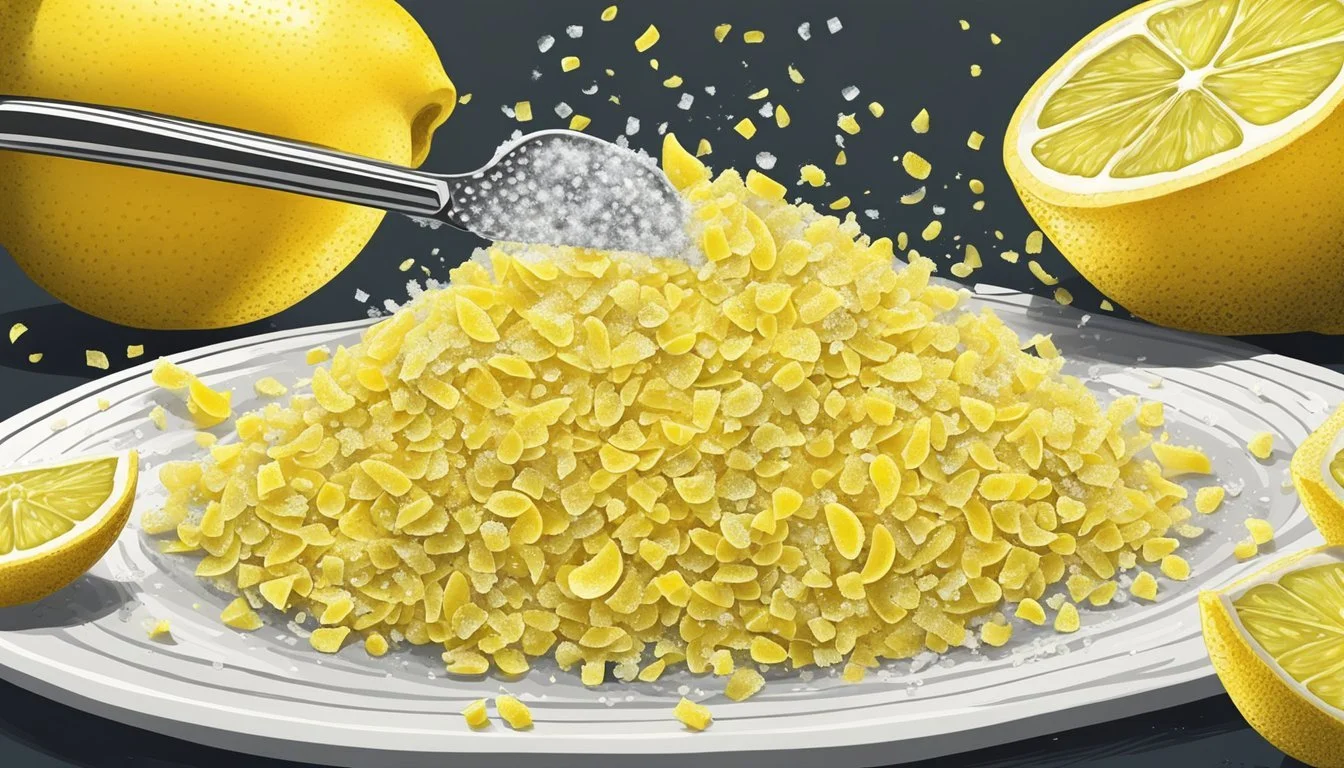Lemon Peel Salt
A Bright, Citrusy Seasoning for Enhanced Flavors
Lemon peel salt is an innovative and flavorful seasoning blend that leverages the vibrant zest of lemons to enhance an eclectic array of dishes. This bright, citrusy concoction is simple yet impactful, combining the aromatic qualities of lemon zest with the crystalline texture of salt. The result is a culinary asset that can transform the ordinary into the extraordinary, adding a new dimension of taste to meats, vegetables, and even the rim of a cocktail glass.
The appeal of lemon peel salt lies in its versatility and ease of preparation, which encourages home cooks and professional chefs alike to infuse their recipes with a burst of citrusy aroma without overwhelming the natural flavors of the food. The seasoning is crafted with carefully dried lemon peel, which is then ground and mixed with salt, ensuring that the essential oils of the lemon are preserved, imparting a fresh and tangy note to every sprinkling.
Those who appreciate the subtleties in their seasoning blends will find that lemon peel salt not only adds flavor but also contributes to the olfactory experience of dining, as its fresh and zesty scent complements its taste. In a culinary landscape that praises innovation and the fusion of flavors, lemon peel salt stands out as a testament to the power of simplicity and the joy of creating something that is at once new and timelessly delightful.
The Origin and Popularity of Lemon Peel Salt
Lemon peel salt, a zesty and tangy seasoning, has roots that hark back to the traditional practices of food preservation. Originating from cultures that valued lemons for their flavor, lemon peel salt emerged as a means to extend the fruit's utility and enhance the taste of various dishes. The lemon's history is steeped in both culinary and medicinal uses, with its citrusy profile proving to be indispensable in kitchens across the world.
Preserving lemons in salt was likely conceived to reduce food waste, ensuring that the flavorful peel could be enjoyed well beyond the fresh lemon's shelf life. With time, this practice evolved into numerous regional variants of lemon peel seasonings. The primary components include ribbons of dried lemon peel combined with coarse salt, both prized for their flavor and preservative qualities.
In terms of culinary uses, lemon peel salt has seen a resurgence in popularity due to its versatile nature. It imparts a bright accent when sprinkled on salads, vegetables, meats, and even desserts. Chefs and home cooks alike treasure it for its ability to integrate effortlessly into an array of cuisines.
Key Components: Dried lemon peel, coarse salt
Uses: Enhancing flavor in salads, meats, desserts
Appeal: Zesty, tangy, bright accent
This seasoning continues to grow in popularity, finding its place in home pantries and gourmet food shops around the globe. Its simple yet impactful flavor profile, paired with its storied history, ensures that lemon peel salt remains a cherished ingredient in modern culinary practices.
Nutritional Profile of Lemon Peel Salt
Lemon peel salt, a seasoning that infuses the tangy essence of citrus with the savoriness of salt, boasts nutritional advantages alongside its flavor enhancing properties. Nutritionally, lemon peel is a powerhouse, containing substantial amounts of vitamin C, potassium, and dietary fiber. These elements render lemon peel salt not only a flavor enhancer but also an ally in nutritional supplementation.
Below is an outline of key nutrients found in lemon peel and salt:
Sodium: The primary component in table salt, it is crucial for maintaining fluid balance but should be consumed in moderation.
Potassium: Abundant in lemon peel, potassium aids in maintaining heart function and muscle contractions.
Calcium & Iron: These minerals are found in trace amounts in lemons and contribute to the overall mineral content of the salt.
Vitamin C: Lemon peels are rich in this antioxidant, vital for skin health and immune function.
Typically, a tablespoon of lemon zest contains:
Nutrient Amount Calories 6 Sodium Variable* Potassium 160 mg Calcium 13 mg Iron 0.08 mg Vitamin C 10.6 mg
*Exact sodium content varies based on the ratio of salt to lemon peel.
It's essential to note that lemon peel salt should be used sparingly due to its sodium component. However, its use in moderate quantities can contribute to the intake of several beneficial nutrients without adding significant calories. Given its bold flavor, a small amount can go a long way both in terms of taste and nutrition.
Lemon Peel Salt Recipe
Lemon peel salt is a simple yet flavorful seasoning that combines the zest of lemons with salt, offering a bright and citrusy twist to a variety of dishes. This easy-to-make condiment is a pantry staple that can enhance the taste profile of any meal with its fresh and tangy flavor.
Gathering Ingredients
To prepare homemade lemon peel salt, one needs a minimal number of ingredients, ensuring purity and freshness in every batch. The essential ingredients include:
Lemons: Typically, 5-6 large, preferably organic as they are less likely to have pesticide residue.
Salt: 1 cup of coarse or flaked sea salt works best to absorb the lemon oils and provide texture.
Optional: A pinch of ground black pepper can be added for those looking for a kick of spice.
Preparation Method
The process of making lemon peel salt involves a few steps that allow the zest to fully infuse the salt:
Begin by thoroughly washing the lemons to remove any surface residue.
Using a peeler or zester, carefully remove the lemon peel in thin strips, avoiding the bitter white pith.
Place the lemon peels in a single layer on a baking sheet and bake at a low temperature (around 200°F) until they dry out, usually 25-30 minutes. One may also opt to air-dry them for a few days.
Once dried, combine the zest with the salt in a food processor and pulse until the desired consistency is achieved.
If desired, add the pinch of ground black pepper and pulse a few more times to integrate.
Storage and Shelf Life
To preserve the homemade lemon peel salt's fresh and vibrant flavors:
Transfer the seasoning to an airtight container to prevent moisture from clumping the salt.
Store it in a cool, dark place, such as a pantry, to maintain its potency.
Properly stored, lemon peel salt should have a shelf life of up to a year.
With these simple steps, one can yield a delightful seasoning that enriches the flavor palette of any cuisine it graces.
Versatility in Cooking
Lemon peel salt enhances a range of dishes with a bright, citrusy touch, from grilled seafood to roasted vegetables. Its unique flavor complements various cooking methods, like grilling and roasting, unlocking new taste dimensions.
Seafood and Chicken Dishes
Grilled Fish: Sprinkling lemon peel salt on fish before grilling can elevate the natural flavors, imparting a zesty note that accentuates the fish's freshness.
Lemon Pepper Chicken: When combined with cracked black pepper, the salt can transform a simple oven-baked chicken into a classic lemon pepper chicken.
Vegetarian Options
Pasta & Salads: The seasoning works wonders on vegetarian dishes (What wine goes well with vegetarian dishes?): a pinch in pasta sauces or over salads adds a refreshing twist.
Roasted Vegetables: Tossing vegetables with lemon peel salt before roasting can create a savory snack with a hint of citrus.
Seasoning for Snacks
Popcorn: For a tangy snack, one could sprinkle lemon peel salt over freshly popped popcorn.
Lemon Pepper Chicken Wings: The seasoning also makes a great addition to chicken wings for a tangy, savory treat.
Health Considerations of Lemon Peel Salt
Lemon peel salt offers a blend of zesty flavor and potential health benefits, incorporating both lemon peel and salt. Its distinctive citrus kick is derived from the lemon peel, which is rich in vitamins and contains beneficial fiber. However, health considerations are essential when using lemon peel salt as part of a diet.
Nutritional Content:
Lemon peels are high in vitamin C and contain traces of calcium and potassium.
Lemon peel salt usually has minimal calories, as the predominant ingredient is the lemon zest.
Sodium Levels: Consumers should be mindful of their sodium intake. While lemon peel salt can enhance flavor without relying entirely on sodium, it still contributes to overall sodium consumption. It is important for individuals, especially those with hypertension or heart conditions, to use this seasoning in moderation to avoid an overly salty diet.
Allergen Information:
Lemon peel salt is naturally gluten-free, making it suitable for individuals with gluten sensitivity or celiac disease.
When sourcing, one should look for organic options to ensure the absence of unwanted pesticides.
Additive Considerations:
Reputed brands tend to avoid artificial additives, maintaining the seasoning's purity.
Preservatives are rarely necessary due to the natural preservative characteristics of salt and the essential oils in lemon peel.
Bottom Line: Using lemon peel salt can be an aromatic, nutritious addition to meals. Still, mindful amounts should be used to keep a balanced intake of sodium while reaping the zestful benefits of lemon peel.
Homemade vs Store-Bought Lemon Peel Salt
When considering lemon peel salt, consumers face a choice between homemade and store-bought options. These choices differ primarily in terms of taste and quality, cost-effectiveness, and control over ingredients, each of which is crucial in determining the best option for individual needs.
Taste and Quality
Homemade lemon peel salt typically offers a more potent and fresh flavor profile. The freshness of the citrus zest plays a crucial role in delivering that bold, zesty taste that many people desire in their seasoning. In contrast, store-bought lemon peel salt may not match the intensity of its homemade counterpart due to the length of time it spends on shelves. However, some high-quality commercial brands can provide a consistently satisfying flavor with the benefit of convenience.
Cost-Effectiveness
From a cost perspective, making homemade seasoning can be more economical, especially if one already has the necessary ingredients at hand, such as garlic powder and onion powder. On the other hand, store-bought lemon peel salt may involve a higher cost due to packaging, branding, and the inclusion of preservatives. These factors must be weighed against each other when considering overall value.
Control over Ingredients
One of the biggest advantages of homemade lemon peel salt is greater control over what goes into the seasoning mix. One can choose to include no additives and opt for organic ingredients if preferred. Additionally, one can adjust the levels of garlic powder, onion powder, and salt to suit individual taste preferences. Store-bought versions, while convenient and consistent, often contain preservatives and anti-caking agents that may not align with everyone's dietary preferences or restrictions.
Creative Uses and Recipe Pairing
Lemon peel salt, featuring a bright and tangy flavor profile, serves as a versatile ingredient that elevates a variety of dishes. It effortlessly infuses foods with a citrusy zest that complements and enhances underlying flavors.
Enhancing Meat Flavors
Lemon peel salt can tremendously uplift the flavor of different meats. For example, lemon pepper chicken wings benefit from the combination of zesty lemon and sharp black pepper. Before grilling or roasting, one can generously season the wings with lemon peel salt to ensure each bite is infused with a robust and citrusy kick.
Pork and Beef: Rub lemon peel salt along with herbs like rosemary and thyme to elevate the natural savory flavors.
Fish: A light sprinkle of lemon peel salt can enhance the delicate flavors of white fish (What wine goes well with white fish?) and seafood.
Vegetable Seasoning
Vegetables take on a whole new dimension when sprinkled with lemon peel salt before roasting or grilling. The salt draws out the natural sweetness of the vegetables, while the lemon adds a refreshing note.
Roasted Veggies: Toss root vegetables with olive oil and lemon peel salt for a caramelized, tangy finish.
Salads: Enhance fresh salads by incorporating lemon peel salt into the mix to amplify the green flavors.
Dressings and Sauces
In salad dressings and sauces, lemon peel salt can be the key ingredient that provides a burst of flavor. It balances the richness of oils and the acidity of vinegars to create a harmonious blend.
Salad Dressing: Use lemon peel salt to make a salad dressing with extra virgin olive oil, vinegar, and a touch of honey for sweetness.
Marinades: Add depth to marinades by including lemon peel salt, which helps to tenderize and infuse the meat with citrusy nuances.
Making Lemon Peel Salt a Pantry Staple
Lemon peel salt is a versatile and bright seasoning blend that can elevate an array of dishes. To make it a staple in one's pantry, proper storage and usage must be considered. It starts with ensuring that the mixture is placed in an airtight container to preserve its zesty flavor and prevent clumping.
A classic jar, perhaps glass, works well as it not only seals the aroma but also allows one to see the vibrant color of the seasoning. This container should then find a spot in the pantry that is cool and dry to further extend the shelf life of the lemon peel salt.
Storing the seasoning in such an environment ensures that the citrus essence is maintained, differentiating it from other spice blends. Here's a simple guideline for storage:
Jar Selection: Pick a jar with an airtight lid; glass is preferred for visibility.
Storage Condition: Place the jar in a cool, dry section of the pantry away from direct sunlight.
Shelf Life: If stored properly, lemon peel salt can last for months without losing its potency.
When incorporating lemon peel salt into one's culinary routine, it becomes a fundamental seasoning blend, alongside other staples like black pepper or garlic powder. This citrus-infused salt can be sprinkled over roasted vegetables, mixed into dressings, or added to marinades, introducing a zesty note to everyday meals.
By treating lemon peel salt as an essential rather than an occasional garnish, it earns its place as a pantry cornerstone. Chefs and home cooks can confidently reach for their jar of lemon peel salt, knowing it will consistently deliver a punch of flavor.
Tips for Perfecting Your Lemon Peel Salt
Crafting the ideal Lemon Peel Salt involves selecting a high-quality salt base, balancing the citrus flavors, and preserving the zest's aroma.
Selecting the Right Salt Base
The foundation of Lemon Peel Salt is, undoubtedly, the salt itself. Kosher salt and sea salt are the preferred choices due to their purity and texture. They are excellent at capturing the essence of the lemon. Kosher salt, with its large, flaky grains, ensures even distribution of the lemon flavor, while sea salt provides a more mineral-rich undertone.
Achieving the Perfect Citrus Balance
The citrus balance is pivotal in Lemon Peel Salt. The zest—either dried lemon zest or fresh lemon zest—is the source of the citrusy profile. When using fresh zest, it should be thoroughly dried to prevent clumping in the salt. The ratio of lemon zest to salt should allow the bright, citrusy character to shine without overpowering the salt's own flavor. A good starting point is one part zest to three parts salt, adjusted to taste.
Ensuring Long-Lasting Aroma
The aroma is what makes Lemon Peel Salt truly special. To maintain this for as long as possible, storage is key. After combining the zest with the salt, the mixture should be stored in an airtight container to protect it from moisture and to preserve the vibrant aroma. Additionally, keeping the salt in a cool, dark place will help sustain its potent citrusy scent.
Beyond Lemon Peel Salt: Variations and Alternatives
Exploring beyond lemon peel salt opens up a world of flavors. Whether by adding different citrus zests or combining with a variety of spices, one can craft an array of homemade seasoning blends.
Other Citrus Salts
Citrus salts made with orange or grapefruit zest can offer a sweeter, more nuanced flavor profile. Lime zest, in particular, imparts a more tropical and zesty twist to any dish. To make lime salt, simply blend the zest of limes with coarse salt in a food processor, ensuring a uniform mixture.
Ingredients:
1/4 cup coarse salt
Zest of 2 limes
Combining with Different Spices
Diversifying lemon peel salt with other spices can enhance its complexity. For instance, adding thyme brings a floral and earthy dimension. Montreal steak seasoning, known for its robust blend which includes garlic, coriander, and dill, can be introduced to create a zestier, more aromatic salt perfect for meats.
Lemon Thyme Salt: Combine lemon zest, salt, and dried thyme.
Lemon Montreal Salt: Merge lemon zest with Montreal steak seasoning and salt.
Homemade Spice Blends
Crafting a homemade spice blend using a spice grinder allows for fresh, potent flavors. Dry ingredients, such as lemon zest and dried herbs, should be ground together until the desired consistency is achieved. These blends can be tailored to personal preference or specific recipes, ensuring versatility and freshness in cooking.
Steps:
Dehydrate lemon zest in the oven.
Measure and mix with dried herbs and salt.
Grind using a spice grinder or food processor until combined.
Conclusion
In the realm of seasonings, lemon peel salt emerges as a versatile player in the kitchen. Its zesty flavor profile is an ode to the invigorating essence of lemon peel, artfully paired with the simplicity and enhancing properties of salt. This combination does not merely add a bright citrusy note; it transcends to a peppery flavor that provides a subtle yet impactful nuance to dishes.
One can readily appreciate its ability to elevate a variety of recipes. The simplicity of this seasoning belies its multifaceted uses—from a finishing touch on savory dishes to a delightful enhancement in baked goods.
Notable Highlights of Lemon Peel Salt:
Zesty Flavor: Infuses meals with a fresh lemon tang.
Peppery Flavor: Offers an understated kick, reminiscent of the beloved lemon pepper seasoning.
Versatility: Adapts to countless dishes, both savory and sweet, transcending culinary borders.
Proponents of homemade seasonings will find that lemon peel salt is a must-have in the pantry due to its effortless preparation and long shelf-life. Moreover, it serves as a healthier alternative to commercial mixes, which often contain additives and preservatives.
As the culinary world continues to cherish both classic and novel flavors, this seasoning holds its ground as a timeless addition to any cook's repertoire. Its existence is not just a testament to the power of combining simple ingredients but also to the joy of creating unique flavors that make every meal memorable.









